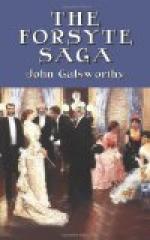Aunt Hester, an authority on family history, described him thus: “I don’t recollect that he ever did anything; at least, not in my time. He was er—an owner of houses, my dear. His hair about your Uncle Swithin’s colour; rather a square build. Tall? No—not very tall” (he had been five feet five, with a mottled face); “a fresh-coloured man. I remember he used to drink Madeira; but ask your Aunt Ann. What was his father? He—er—had to do with the land down in Dorsetshire, by the sea.”
James once went down to see for himself what sort of place this was that they had come from. He found two old farms, with a cart track rutted into the pink earth, leading down to a mill by the beach; a little grey church with a buttressed outer wall, and a smaller and greyer chapel. The stream which worked the mill came bubbling down in a dozen rivulets, and pigs were hunting round that estuary. A haze hovered over the prospect. Down this hollow, with their feet deep in the mud and their faces towards the sea, it appeared that the primeval Forsytes had been content to walk Sunday after Sunday for hundreds of years.
Whether or no James had cherished hopes of an inheritance, or of something rather distinguished to be found down there, he came back to town in a poor way, and went about with a pathetic attempt at making the best of a bad job.
“There’s very little to be had out of that,” he said; “regular country little place, old as the hills....”
Its age was felt to be a comfort. Old Jolyon, in whom a desperate honesty welled up at times, would allude to his ancestors as: “Yeomen—I suppose very small beer.” Yet he would repeat the word ‘yeomen’ as if it afforded him consolation.
They had all done so well for themselves, these Forsytes, that they were all what is called ‘of a certain position.’ They had shares in all sorts of things, not as yet—with the exception of Timothy—in consols, for they had no dread in life like that of 3 per cent. for their money. They collected pictures, too, and were supporters of such charitable institutions as might be beneficial to their sick domestics. From their father, the builder, they inherited a talent for bricks and mortar. Originally, perhaps, members of some primitive sect, they were now in the natural course of things members of the Church of England, and caused their wives and children to attend with some regularity the more fashionable churches of the Metropolis. To have doubted their Christianity would have caused them both pain and surprise. Some of them paid for pews, thus expressing in the most practical form their sympathy with the teachings of Christ.
Their residences, placed at stated intervals round the park, watched like sentinels, lest the fair heart of this London, where their desires were fixed, should slip from their clutches, and leave them lower in their own estimations.




